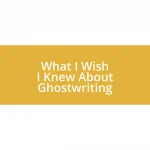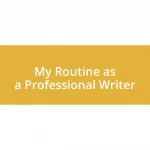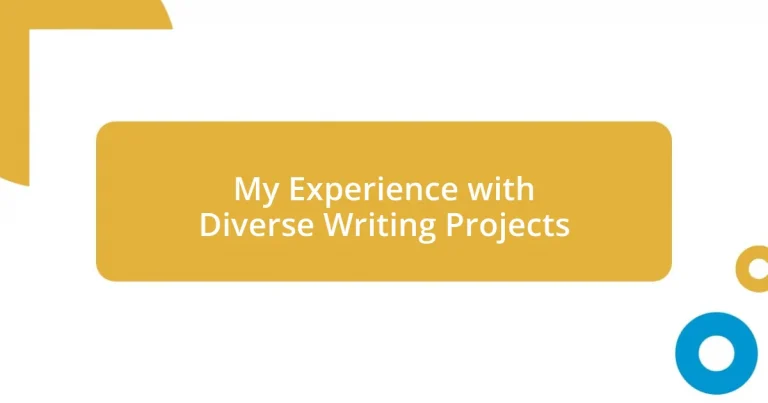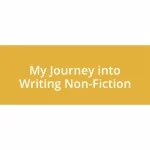Key takeaways:
- Diverse writing collaborations reveal unique perspectives that enhance storytelling and create richer narratives.
- Understanding and respecting different cultural contexts is crucial for authentic representation in writing.
- Feedback and revision are essential tools for refining writing and developing clarity and impact.
- Experimentation with various styles fosters creativity and helps build a personal voice in writing.
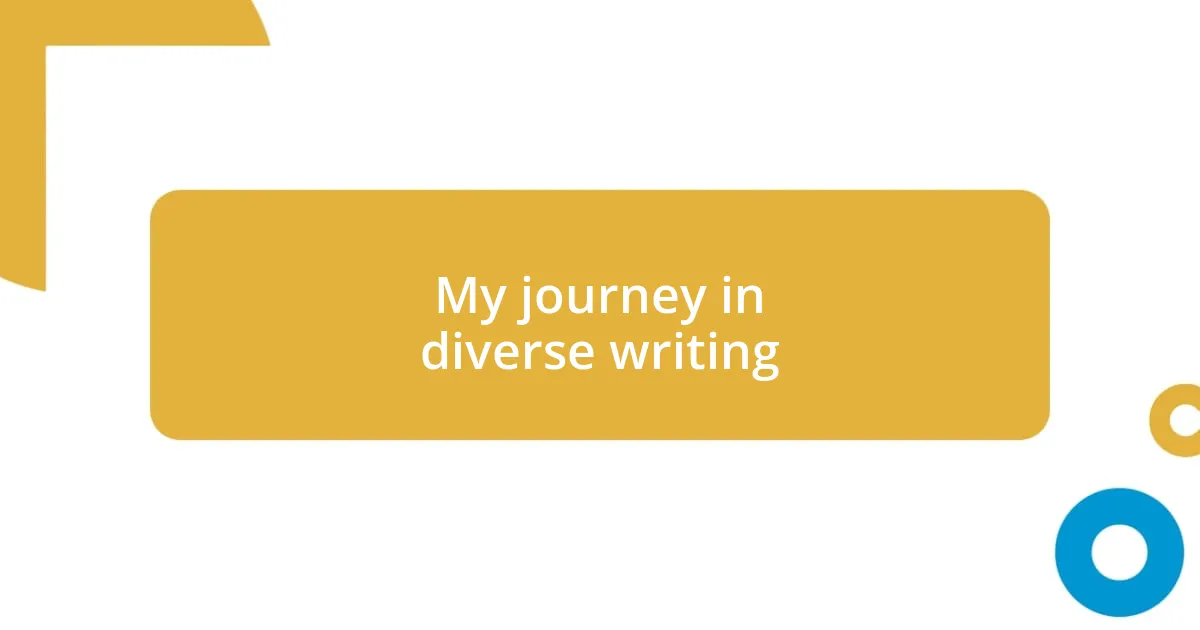
My journey in diverse writing
Diving into the world of diverse writing has truly been a transformative journey for me. I vividly remember the first time I penned a short story that was completely outside my comfort zone—a tale set in a dystopian world. As I wrote, I felt a rush of fear and excitement, wondering if I’d successfully captured the emotions of characters so far removed from my own experiences. Have you ever felt that exhilarating mix of trepidation and creativity?
One of the most rewarding experiences was collaborating on a community project to write about local history. Each participant brought their unique perspective, and I found myself immersed in stories that resonated deeply with my own heritage. As I listened to their narratives, I realized that diverse writing isn’t just about different topics; it’s about weaving a tapestry of lives and experiences. It made me reflect: how often do we take the time to listen to stories that differ from our own?
Another memorable project involved creating content for a nonprofit focused on mental health awareness. Writing, in this case, wasn’t just an intellectual exercise; it became a mission to convey hope and understanding. I often paused to consider the impact of my words on someone who might be struggling. Isn’t it fascinating how words can heal and connect us in ways we often overlook? This journey has taught me that every writing project, no matter how different, holds the potential to inspire and inform.
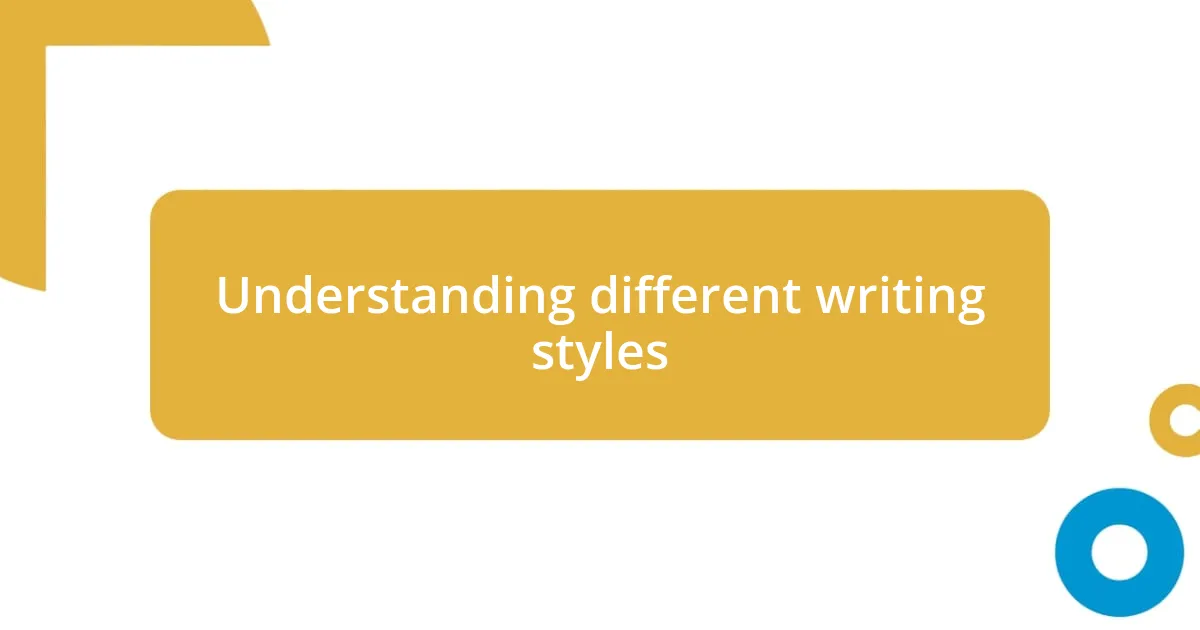
Understanding different writing styles
The beauty of understanding different writing styles lies in recognizing how each format serves a distinct purpose. For instance, I once tackled writing a persuasive essay on climate change, which required me to not only present facts but also connect emotionally with my readers. It was a fascinating challenge; I had to ground my arguments in data while penning heartfelt appeals. Have you ever found it tough to balance logic and emotion in your writing? I’ve learned that it’s essential to acknowledge the audience’s perspective and address their feelings, creating a more compelling argument.
I’ve also experimented with poetry, which feels like stepping into a different universe altogether. The first time I wrote a poem about love lost, I poured my heart into each line, layering emotions carefully to evoke that pang of longing. Unlike prose, poetry often relies on rhythm and imagery, forcing me to distill my feelings into a few powerful words. It’s incredible how a simple phrase can resonate deeply—in poetry, every word counts. When was the last time you wrote something that made you pause and reflect?
Furthermore, writing for digital media challenged me to adapt my style for a fast-paced audience. I remember creating blog posts where the hook had to grab attention almost instantly. It felt exhilarating yet daunting to think about how much a reader skims through online content. Crafting short, engaging sentences became my primary goal. How can we make readers stop scrolling? I found that incorporating visuals and succinct, relatable language were key strategies I adopted to connect with my audience effectively.
| Writing Style | Description |
|---|---|
| Persuasive | Focus on convincing the reader through logical arguments and emotional appeals. |
| Poetry | Utilizes imagery and rhythm to express feelings and ideas in a condensed form. |
| Digital Media | Adapts to a fast-paced environment, requiring concise, engaging content that captures attention quickly. |
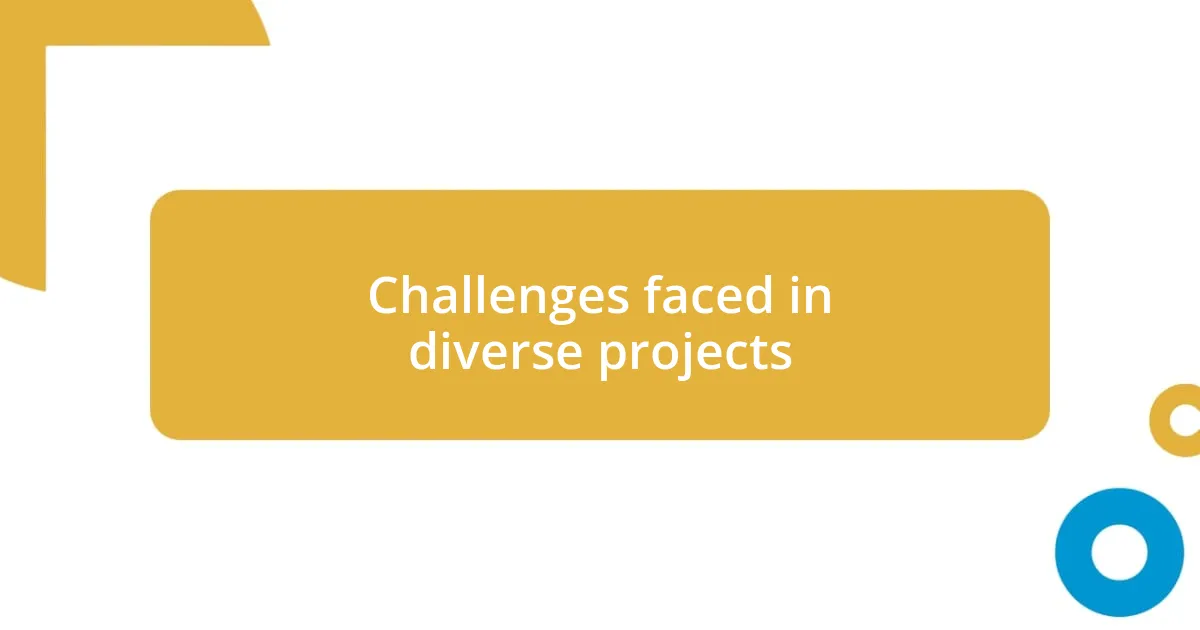
Challenges faced in diverse projects
Engaging with diverse writing projects often presents unexpected challenges that can test one’s skills and creativity. I remember grappling with the nuances of writing for different cultural contexts. One particular project required me to craft a series of articles celebrating regional festivals, and I soon realized that understanding the local customs and language was crucial. It wasn’t just about putting words on a page; it was about respecting and accurately representing a culture that wasn’t my own. It made me reflect deeply on the weight of responsibility that comes with diverse writing, realizing that even a small oversight could misrepresent stories that hold significant meaning for others.
- Cultural Sensitivity: Crafting narratives that honor diverse backgrounds requires extensive research and awareness.
- Varying Expectations: Different genres often come with their own sets of expectations, like tone shifts that can feel jarring.
- Fear of Misinterpretation: There’s a constant worry about how my interpretations might be perceived by those who belong to the communities represented.
- Creative Block: Transitioning between projects with vastly different themes can sometimes cause mental fatigue or writer’s block.
Another hurdle I’ve encountered is the fear of inadequacy while tackling subjects far removed from my personal experiences. For instance, I once wrote a piece about the struggles faced by refugees. I found it emotionally taxing, as I reflected on their realities. The weight of wanting to do justice to their stories was immense. I vividly remember sitting with a cup of tea, staring at a blank page, torn between wanting to speak for those whose voices I could only imagine and the knowledge that I must still evoke their truths with authenticity. It was a profound lesson in humility and the power of empathy in writing.
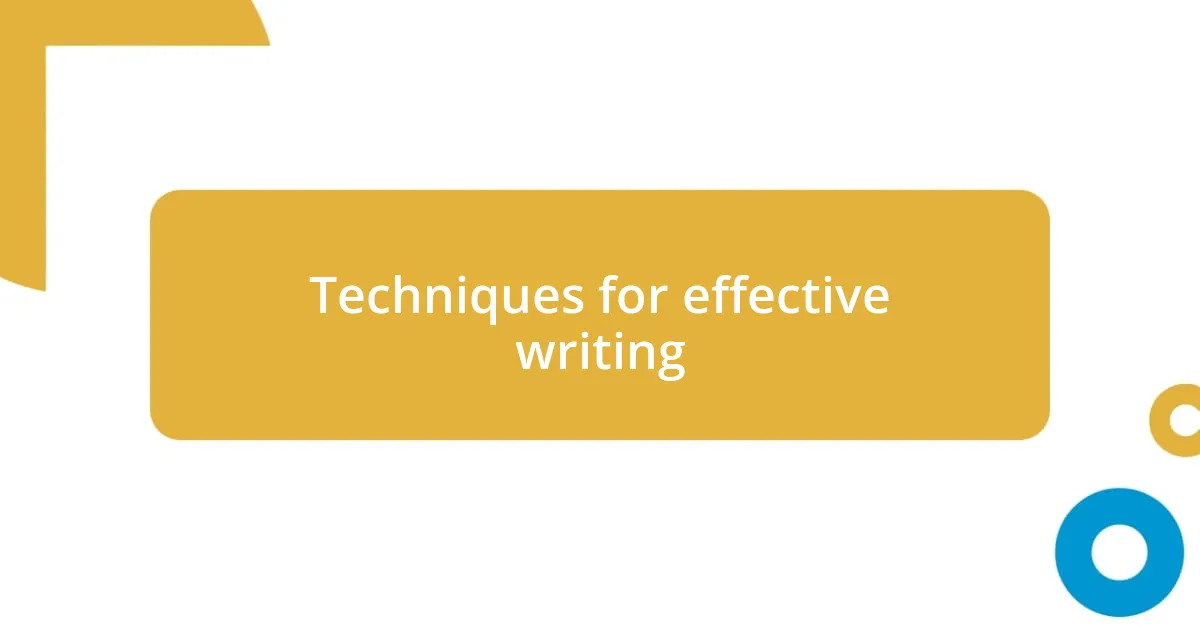
Techniques for effective writing
One technique that has effectively enhanced my writing is the power of revision. I often find that my first drafts serve merely as stepping stones to uncovering my best ideas. After all, the real magic happens in the editing process. How often do you revisit your work, hoping to transform it into something clearer and more impactful? I’ve learned that pulling back to view my writing with fresh eyes allows me to refine my thoughts, sharpen my language, and sometimes even uncover a completely new angle.
Another strategy I’ve embraced is the use of outlining. When faced with a complex topic, I tend to start by jotting down key points and how I envision them connecting. Take it from my experience writing a comprehensive guide on mental health; organizing my thoughts on paper not only kept me focused but also allowed me to see the bigger picture more clearly. Isn’t it rewarding to visualize how different elements interact? By mapping out my ideas, I create a clear path for my readers to follow, enriching their journey through the piece.
Finally, integrating feedback from others has profoundly shaped my writing style. There was a time when I hesitated to share my work, fearing criticism. Yet, after courageously seeking opinions from trusted peers, I found their insights tremendously helpful. Have you ever been surprised by how much someone else can reveal about your writing? I recall a particularly memorable piece where a friend pointed out an unclear passage. That simple observation led me to clarify my message, transforming a good piece into a great one. It’s a reminder that writing is not just a solitary act; it thrives on collaboration and shared perspectives.
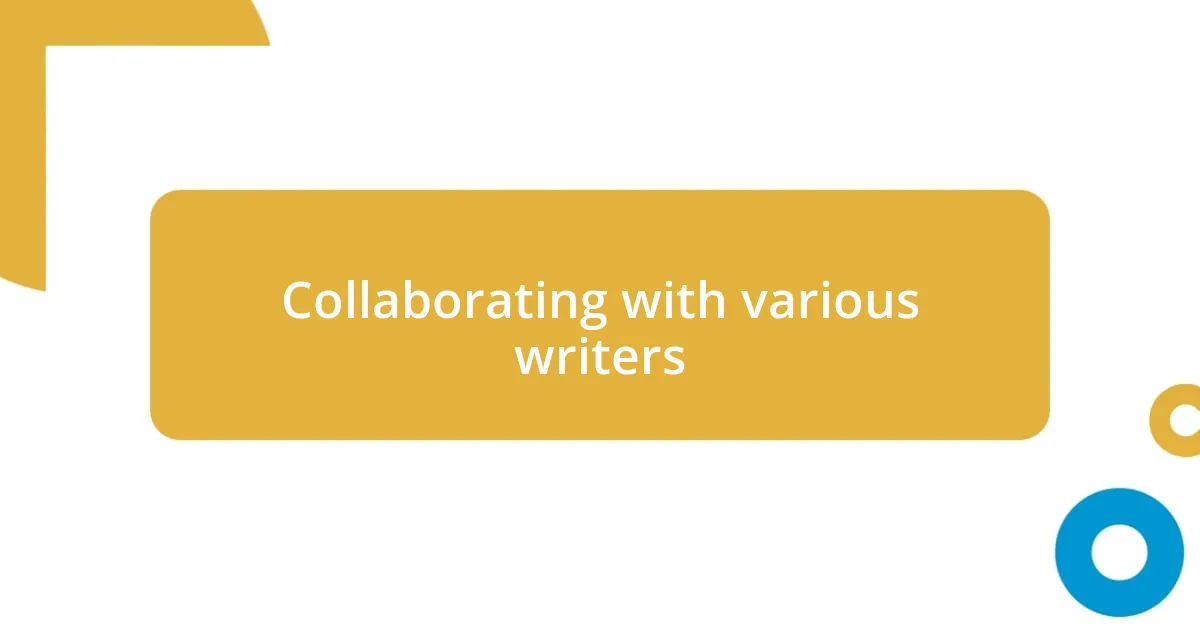
Collaborating with various writers
Working with other writers has been an eye-opening experience for me. I remember one particular collaboration where I teamed up with two authors from completely different backgrounds. They brought fresh perspectives that challenged my own approach to storytelling. It was a wonderful revelation to see how our styles intertwined, creating a richer narrative than I could have crafted solo. Have you ever felt that spark of creativity when someone else’s words dance alongside yours? It’s truly exhilarating.
What’s fascinating about diverse writing partnerships is the blend of expertise that emerges. For instance, during a project on environmental issues, one of my collaborators had a deep background in science communication. That knowledge transformed our initial draft from good to exceptional. I learned to appreciate the nuances of conveying complex information in an accessible way. Have you ever realized how someone else’s strengths can elevate your own work? It’s a reminder that collaboration is not just about dividing tasks; it’s about merging talents.
However, navigating different working styles can sometimes be tricky. I recall a project where one writer preferred a more structured outline, whereas I tended to go with the flow. Initially, it caused some friction, but ultimately, we found a middle ground that respected our individual processes. Has a clash of styles ever led you to unexpected breakthroughs? That experience taught me that flexibility and open-mindedness are crucial when collaborating. After all, embracing these differences can lead to innovative and unexpected outcomes.
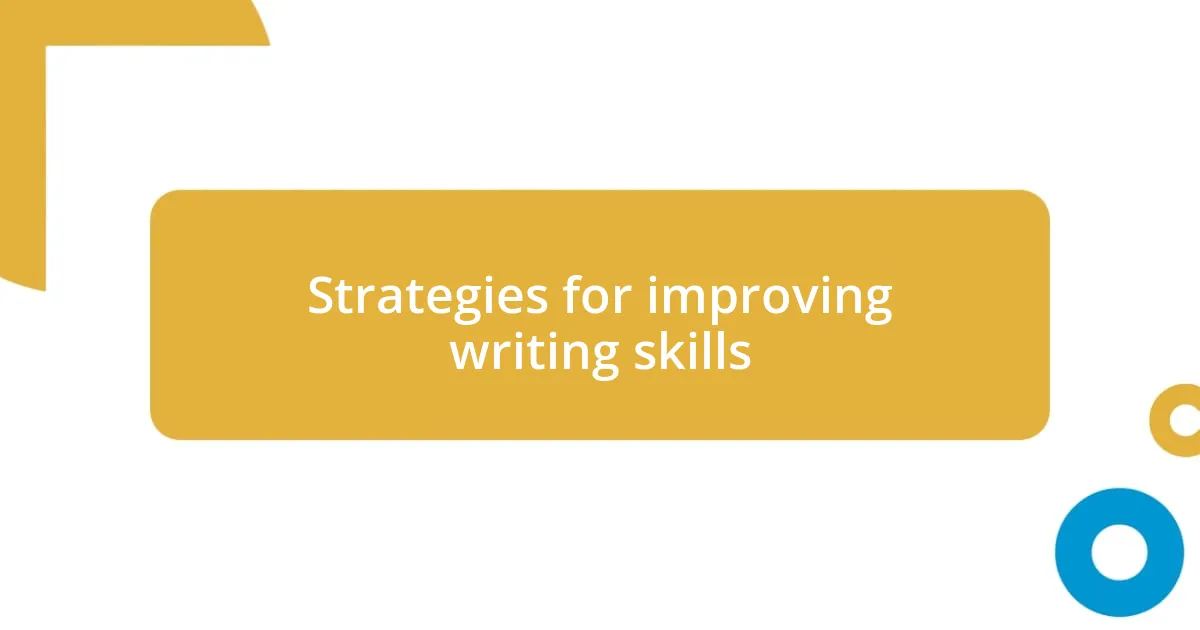
Strategies for improving writing skills
One effective strategy I’ve found to improve writing skills is the practice of reading widely. Immersing myself in diverse genres not only exposes me to different voices but also sharpens my own style. I remember once diving into a collection of poetry; each poem presented a new way to convey emotion. Have you ever experienced a moment when a piece of writing made you see language in a completely different light? It’s fascinating how those moments can inspire fresh approaches in our writing.
Another approach that has proven invaluable is the discipline of setting writing goals. When I began working on my personal blog, I aimed to write consistently, even if it was just for 15 minutes a day. This small commitment helped me develop a habit that turned into a substantial body of work over time. Isn’t it amazing how small, regular efforts can yield great results? I’ve learned that when I break down my goals into manageable chunks, it not only keeps the process enjoyable but also less daunting.
Lastly, embracing experimentation in writing is essential. I recall a period where I challenged myself to write flash fiction, pushing myself to convey complete stories in under 500 words. It was both exhilarating and frustrating! Yet, that experience taught me the importance of precision in language and the power of brevity. Have you considered trying a different format or genre? Stepping out of your comfort zone can lead to delightful discoveries in your writing journey.
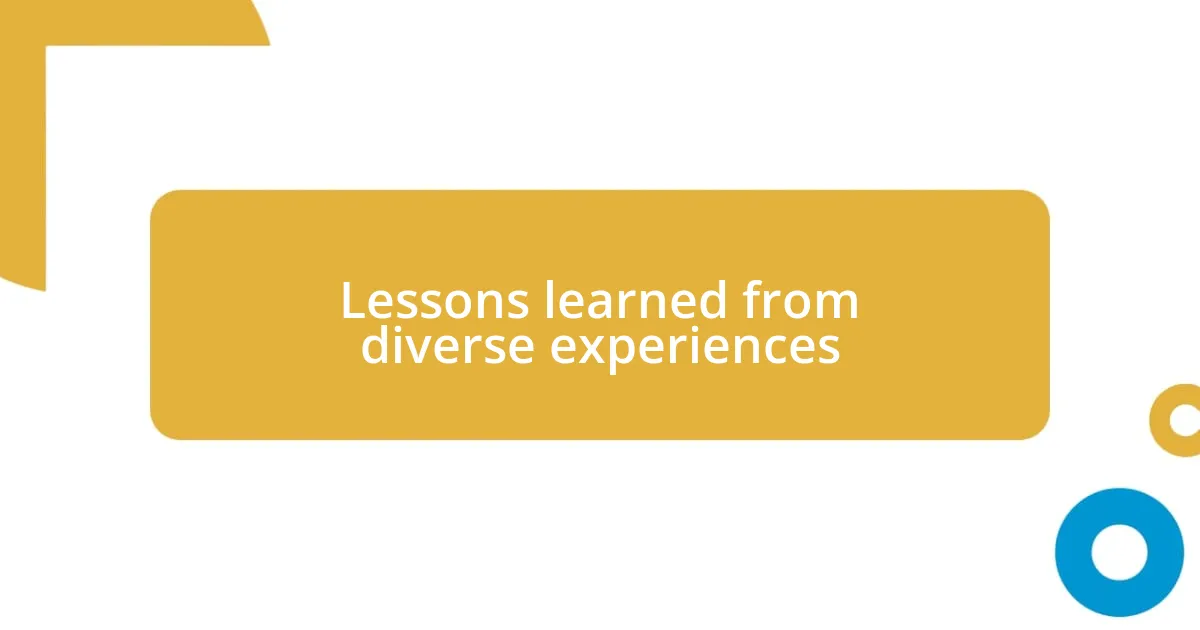
Lessons learned from diverse experiences
It’s amazing how diverse writing experiences can shape our understanding of audience engagement. I recall writing a piece for a multicultural audience that made me rethink my language choices entirely. My initial draft was filled with jargon that I thought would impress, but feedback from readers revealed it was alienating. Have you ever discovered that simplicity and clarity can resonate more deeply than complexity? I learned that connecting with an audience often means leaving my comfort zone and seeking clarity over cleverness.
Additionally, tackling various styles has opened my eyes to the power of voice. I once experimented with a first-person narrative for a memoir piece, which forced me to dig deep into my emotions and memories. That was a real turning point for me; suddenly, I wasn’t just recounting events but inviting readers into intimate moments of vulnerability. Can you imagine how much more impactful our stories become when we show the raw truths behind them? This experience reinforced that authenticity creates a strong connection, something I now cherish in every piece I write.
Ultimately, resilience has emerged as a vital lesson in my diverse writing journey. There was a time when I faced harsh criticism for a sci-fi short story I submitted to a contest. Initially, it stung deeply, but instead of retreating, I sought feedback and rewrote the piece. The result was a much stronger story that ended up getting published elsewhere. Have you ever felt that sting of rejection turn into motivation? It taught me that every setback can fuel growth if I’m willing to learn and adapt.

